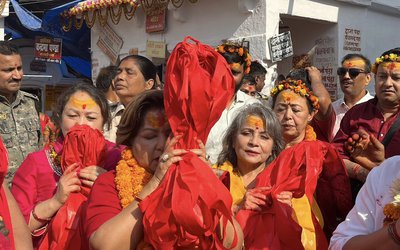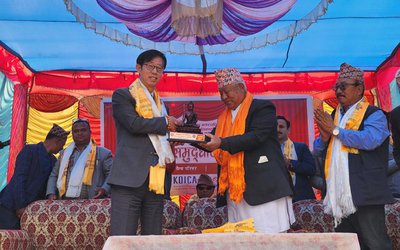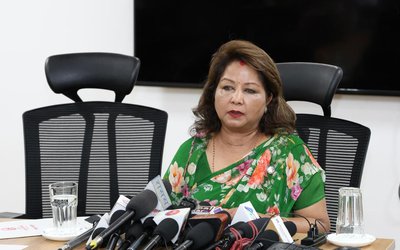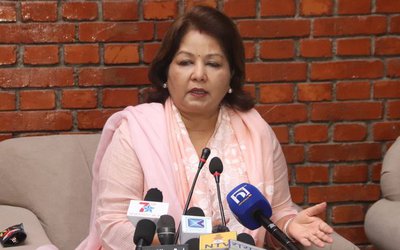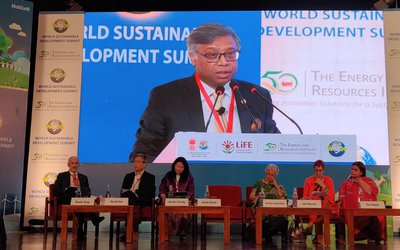
A day after the government team headed by deputy prime minister Kamal Thapa and United Madhesh Front leaders made some progress to find a solution to the 3-month long agitation, the police intervention to open the blockade at the no man's land in Birgunj has pushed the negotiations on the verge of collapse
For the first time in these months, the government had shown some positive gestures towards the demands of the Madheshis and Tharus. The government and its supporters spent their entire month blaming India for all the blockade and the resulting problems.
Following the police intervention, Madheshi agitators came to streets, in a huge number, chanting slogans and burning tires and disturbing normal life in Birgunj and other districts of Terai Plains. The District Administration Office even issued a curfew order in Birgunj and surrounding areas to maintain law and order.
Following the clearance of no man's land by Nepal Police, 400 Indian trucks and tankers stranded in Nepalese side of border left Nepal safely. However, the agitators again captured the checkpoint within a few hours. In a pitched battle between Police and agitators to control and retake the border flow, an Indian citizen was killed in police firing and dozens of agitators and Police officials were injured.
After this incident, there is again a cloud of uncertainty hovering over the talks process. The positive atmosphere created has been short lived. Facing the scarcity of essential goods, petrol and gas due to the disruption of border and unofficial blockade of India, common people in the streets of Kathmandu have again lost their faith about returning normalcy.
The life of people living in Madhesh, which has been facing the agitation and disturbance for the few months, is also very hard. Schools and business are shut and there is desperation among the people.
“We deplore the use of force in border areas and police firing and killing an innocent man,” thundered Laxman Lal Karna, leader of Sadbhbana Party. “We have information that the government is considering to use force, including to mobilize the army to quell our peaceful agitation.”
“This action showed that the government is not serious to address the genuine demands of Madheshis, Janjatis and other marginalized communities,” said Karna. “Our agitation is peaceful and it is the government which is responsible to make the agitation violent.”
Soon after the incident, Madheshi leaders phoned UCPN-Maoist leader Prachanda and Home minister Shakti Basnet and expressed anger over the incident. “This indicates that the government led by prime minister K.P.Sharma Oli is not serious to address the demands put forth by Madhesh, Tharus and Janjatis,” said Karna."Is this a way to make progress in negotiations?”
On talks a day before, Madheshis presented their 9-point demands to the government team. The demands include inclusion in all levels of government, constituencies based on population, demarcation of two provinces in Madhesh and citizenship provision, treatment to citizens mentioned in the Interim Constitution, and complete autonomy to the province and so on.
As the government led by deputy prime minister Thapa accepted to address the demands of Madheshis, including the demarcation of provinces, the negotiation was rescued. However, the incident of Birgunj has pushed back the progress again.
With the backing of high level committee led by Prachanda, the government negotiating team agreed to be flexible on all issues. “We will address the demands of Madheshis politically,” said Kamal Thapa.
The government side also expressed regret on the incident. "This should have been avoided. We are ready to address the political demands raised by Madheshis and Tharus,” said Minister Rekha Sharma and member of high level government talk’s team.
The government must realize that it cannot escape from responsibility to address the genuine demands of Madheshis and Tharus, putting all the blame on India and Indian blockade. Only after the putting the house in order, accepting the genuine demand of Madheshis and Tharus, Nepal may face any foreign intervention united with strength.
- ADB’S CHIEF ECONOMIST: Nepal Reduces Poverty
- Mar 11, 2025
- FM DR. DEUBA: A Successful Visit
- Mar 11, 2025
- MD GHISING: Target Of Personal Grudge
- Mar 09, 2025
- UPPER TRISHULI-1 HYDROPOWER: Supporting Community Development
- Feb 24, 2025
- ADB POWERING NEPAL: Five Decades Of Support
- Feb 24, 2025

